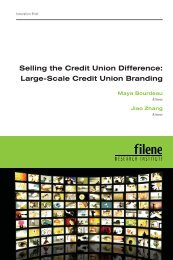Credit Union and Cooperative Patronage Refunds - Filene ...
Credit Union and Cooperative Patronage Refunds - Filene ...
Credit Union and Cooperative Patronage Refunds - Filene ...
Create successful ePaper yourself
Turn your PDF publications into a flip-book with our unique Google optimized e-Paper software.
When rural electric cooperatives are dissolved, <strong>and</strong> after payment of<br />
all creditors <strong>and</strong> equity credits, the remaining proceeds are distributed<br />
on the basis of historical patronage in keeping with the co-op<br />
principles of subordination of capital, service at cost, <strong>and</strong> the co-op<br />
agency theory of earnings.<br />
The NRECA is <strong>and</strong> has been proactive in encouraging rural electric<br />
cooperatives to ratchet up the priority of redeeming capital credits.<br />
In 2005, the NRECA reassembled a task force <strong>and</strong> updated its guide,<br />
“Capital <strong>Credit</strong>s Task Force Report, a Distribution <strong>Cooperative</strong>’s<br />
Guide to Making Capital <strong>Credit</strong>s Decisions.” This guide supports<br />
the idea that rural electric cooperatives must manage their equity<br />
capital more proactively <strong>and</strong> redeem equity credits on a systematic<br />
basis.<br />
Rural electric cooperatives are being challenged in lawsuits 23 to live<br />
up to the idea that they are not capital hogs. At least six lawsuits have<br />
been initiated against rural electric cooperatives to redeem equity to<br />
members. The lawsuits are not evidence that rural electric cooperatives<br />
are hoarding capital, but that is what is at issue in this litigation.<br />
In each case, the board of directors is alleged to have failed to redeem<br />
equity credits according to its fiduciary obligations. These boards of<br />
directors may be ordered to redeem equity credits if the plaintiffs can<br />
prove these rural electric cooperatives have surplus working capital<br />
that is not required for present or future capital requirements. The<br />
oddity is that most boards of directors of cooperatives—including<br />
rural electric cooperatives—are driven by a strong moral compulsion<br />
to redeem allocated equity sooner rather than later. As we said<br />
earlier, co-ops are not driven to hoard capital. Hence, we would not<br />
be surprised that these rural electric cooperatives simply do not have<br />
sufficient surplus working capital to redeem lots of allocated equity.<br />
In addition, these plaintiffs may also need to overcome the presumption<br />
that equity credits do not vest or confer ownership in members<br />
until the board of directors affirmatively resolves to redeem the<br />
equities. This, parenthetically, is a point of contrast with Sub-T<br />
cooperatives, where, under the consent provisions discussed above,<br />
ownership of the equities vests immediately in members upon allocation<br />
of patronage income to members.<br />
Federal L<strong>and</strong> Bank Associations<br />
(501(c)(1) <strong>and</strong> 12 U.S.C. 2098)<br />
Federal L<strong>and</strong> Bank Associations (“L<strong>and</strong> Banks”) are tax exempt (as<br />
are federal credit unions under 501(c)(1)) because they exist under<br />
an act of Congress. L<strong>and</strong> Banks may, but are not required to, allocate<br />
or apportion income (patronage or nonpatronage <strong>and</strong> unrelated<br />
30








